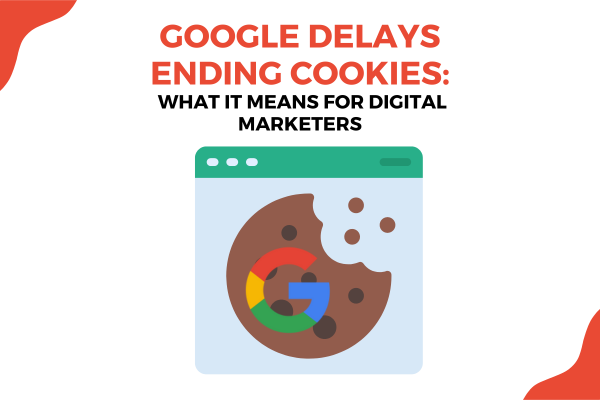
Google Delays Ending Cookies: What It Means for Digital Marketers
In a world increasingly focused on privacy and data protection, Google’s decision to delay the phase-out of third-party cookies has significant implications for digital marketers. Initially planned for 2022, Google has now extended the deadline for 2025 allowing more time for the advertising industry to adapt to a cookie-less future.
This article delves into the reasons behind this delay, its impact on the digital marketing landscape, and how marketers can prepare for the inevitable shift.
Why Google delayed the phase-out
Google’s decision to delay the end of third-party cookies stems from several critical factors:
- Technical challenges: Developing and testing viable alternatives to third-party cookies is a complex process. Google’s proposed alternative, Privacy Sandbox, designed to create a more private web, requires extensive testing to ensure it can effectively balance user privacy and the needs of advertisers.
- Industry feedback: The digital advertising ecosystem is vast and diverse. Feedback from advertisers, publishers, and developers highlighted the need for more time to adapt and transition smoothly to new tracking technologies without disrupting their business models.
- Regulatory considerations: Privacy regulations worldwide, such as the GDPR in Europe , are continually evolving. Google aims to ensure that any new technologies comply with these regulations, necessitating a more cautious approach.
Impact on the digital marketing landscape
The delay in phasing out cookies presents both challenges and opportunities for digital marketers:
- Extended timeline for transition: Marketers now have additional time to explore and implement cookie alternatives. This extension provides a critical window to test new strategies, tools, and technologies that align with privacy-centric standards.
- Increased focus on first-party data: With third-party cookies on the way out, the importance of first-party data—information directly collected from customers—has surged. Companies are prioritising the collection and analysis of first-party data to build personalised marketing campaigns.
- Exploring new tracking technologies: As Google moves towards a more privacy-centric web, they have been developing and refining new tracking technologies under the Privacy Sandbox initiative. The goal is to deliver relevant ads while preserving user anonymity.
Initially, Google proposed the Federated Learning of Cohorts (FLoC), but it has since been replaced by the Topics API. These tools aim to deliver relevant ads while preserving user anonymity. Marketers need to stay informed and experiment with these technologies to understand their effectiveness.
- Enhanced privacy measures: The delay also underscores the growing emphasis on user privacy. Marketers must prioritise transparent data practices, giving consumers more control over their data and building trust in the brand.
Here’s what marketers need to know about new technologies under the Privacy Sandbox initiative:
Topics API
The Topics API is Google’s latest approach to interest-based advertising. Instead of tracking individual users, this API assigns users to various broad topics based on their browsing history. For example, if a user frequently visits sports websites, they might be associated with a "Sports" topic.
- Functionality: When a user visits a website that supports the Topics API, the browser will share up to three topics, one from each of the past three weeks of browsing activity, with the website and its advertising partners.
- User control: Users can view and manage the topics associated with them, providing more transparency and control over their data.
- Privacy: The Topics API does not involve tracking individual users across websites. Instead, it categorises users into interest groups, thus preserving anonymity.
Preparing for a cookie-less future
To thrive in a post-cookie world, digital marketers should consider the following strategies:
- Invest in first-party data: Collecting and leveraging first-party data is more crucial than ever. Encourage customers to share their information through value-driven interactions such as loyalty programs, personalised offers, and engaging content.
- Utilise contextual advertising: Contextual advertising targets users based on the content they are viewing rather than their browsing history. This privacy-friendly approach can help maintain ad relevance without relying on cookies.
- Adopt privacy-first technologies: Stay updated on new privacy-centric technologies and incorporate them into your marketing strategy. Tools like Google’s Privacy Sandbox offer alternatives to traditional tracking methods.
- Strengthen customer relationships: Building strong, trust-based relationships with customers is essential. Transparency about data collection and usage practices will foster trust and encourage users to share their information willingly.
- Stay agile and informed: The digital marketing landscape is continually evolving. Regularly update your knowledge on industry developments, regulatory changes, and emerging technologies to stay ahead of the curve.
Google’s delay in ending third-party cookies provides a valuable opportunity for digital marketers to prepare for a future that prioritises privacy and user control.
By focusing on first-party data, exploring new tracking technologies, and maintaining transparency, marketers can navigate this transition smoothly and continue to deliver effective, privacy-conscious advertising campaigns.
As the landscape evolves, staying informed and agile will be key to thriving in the new era of digital marketing.
At Faye Digital, we’re committed to helping you navigate the evolving digital marketing landscape. Contact us today or call us at 03 7046 4688 to learn how we can help. Let’s work together to build effective, privacy-conscious advertising strategies for your business.
